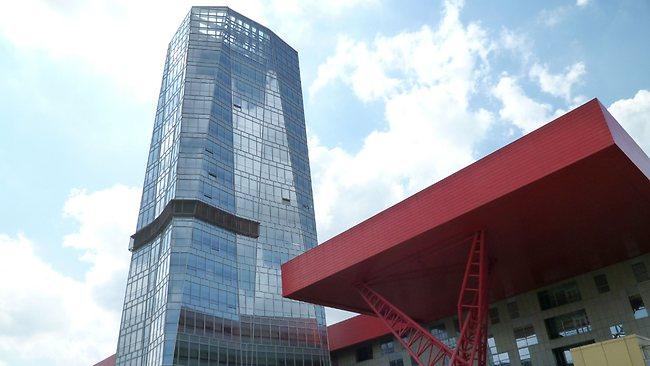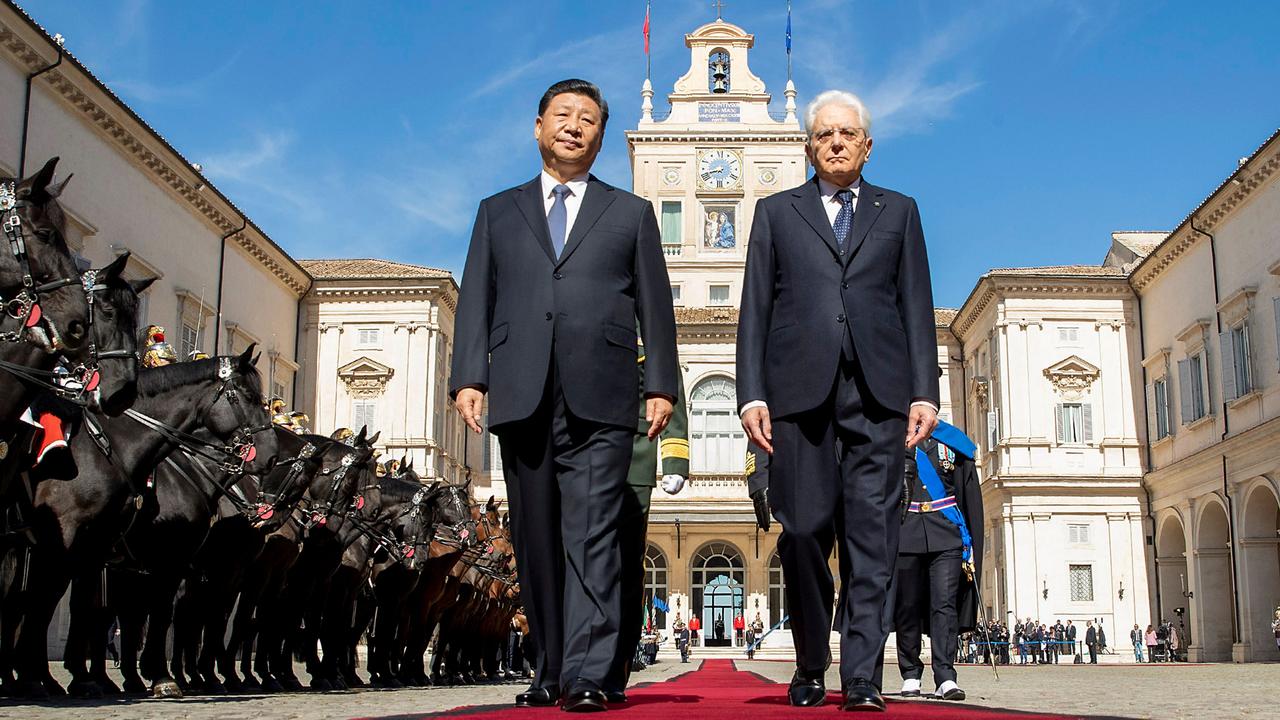The business of ideology in China

This massive, French-designed cluster of futuristic buildings provides a core answer to the enigma of China.
How does China's Communist Party keep a country of 1.3 billion people stable while driving the new ideas it needs if it is to maintain its hectic growth in prosperity and power?
Substantially, through party schools, which are the most lavishly equipped educational institutions in the world. They are responsible not only for shaping new cadres but also for sharpening the top leaders. Every official in China is required to spend time at a live-in course at a party school every year or two.
This is one of the secrets behind the capacity of the Chinese party, with its 74 million members, to keep ruling such a vast country after the other big one-party states have folded. These institutions are even training foreign officials, including Canberra bureaucrats.
Top Chinese Communist Party cadres are not being schooled solely in Mao Zedong or Karl Marx, although they remain on the syllabus. They're also being trained by the likes of Allan Fels. Australia's celebrated former competition tsar is one of the foreign guest lecturers frequently invited to speak at the China Executive Leadership Academy Pudong.
Its Chinese name explains more straightforwardly what it is: National Communist Party Cadre School. Former prime minister Bob Hawke also has lectured to the cadres there. So have former foreign minister Alexander Downer and Queensland Treasurer Andrew Fraser. About 15 per cent of lectures are given by foreigners.
It is one of six national-level institutions, including the Central Party School in Beijing, which are the finishing schools, the research resources and the drivers of new directions for the people who run China, who combine the roles of bureaucrats and politicians.
The school also has run four programs for Australian federal public servants.
The Pudong school is especially internationally minded, inevitably given its location in the thrusting satellite city teeming with international corporate offices that has been created in the past 15 years across the Huangpu River from old Shanghai.
The main building of the school, opened five years ago, is a massive, long, red-roofed structure from which an office tower juts. Its shape is intended to resemble a Ming dynasty Chinese scholar's desk, with the tower as the brush-holder.
It has 870 residential rooms on the campus, in eight five-storey hotel-like blocks shaped to resemble folding books, which are run by Jin Jiang, one of China's best known hotel chains. Each window has a view over the river or the lake at the centre of the school.
The library is surprisingly diverse. Alexander McCall Smith, creator of The No 1 Ladies' Detective Agency, rubs shoulders on the shelves with Angel Customers and Demon Customers: Discover Which is Which and Turbo-Charge Your Stock.
Jiang Haishan runs the school. He is its vice-president, the president being Li Yuanchao, who is chief of the national party's formidable Organisation Department, and the school's titular head.
Jiang, who spent almost two years in Australia, taking education courses at La Trobe University in Melbourne and at the University of Queensland, spoke at length to Inquirer about the ways in which China's leaders were trained and shaped.
China expert Andrew Nathan, at Columbia University, has said: "Today's Communist Party is a highly developed bureaucracy like IBM or General Motors. It's not the party of Mao's time."
And just as the big corporations expect their leading managers to have MBAs from business schools, so does the party expect its top leaders to graduate from its specially targeted finishing schools.
Jiang says that because the Yangtze Delta has been at the fore of China's economic engagement in globalisation, it is the natural centre for an institution that seeks to transfer the experiences and lessons of the dynamic three decades since the country opened to the world.
Pudong, he says, is a potent symbol of this development era and, in combination with the traditional communist heritage of Shanghai, makes the ideal location for such a centre.
"We want China to become more integrated into the international community," Jiang says.
Every year, CELAP runs two fortnight-long programs for the bosses at state-owned enterprises on how to pursue the new national imperative to go global by investing aggressively across the world, with Australia the top target so far.
Jiang says the party's secretary general and China's President, Hu Jintao, wanted the Pudong centre "to seek new paths, to apply leadership training in a practical way, to obtain concrete results".
The Pudong model, he says, is to focus the curriculum on problem-solving. "We hope the officials of today can really understand our context, our situation and the world situation. So in the last two years we have run many programs on the financial crisis."
Every year Pudong has two or three courses with 40 participants at the ministerial level, and recently most have focused on solving financial dilemmas. Lecturers have come from Citibank, Goldman Sachs and other big capitalist companies.
Other recent courses, says Jiang, have been dominated by advice on how to transform China's central agencies or its regions or state-owned corporations into environmentally friendly and energy-saving entities. Emergency and risk management provide another prominent theme.
People's Liberation Army officers also attend courses, with a curriculum tailored for the Defence University that gives them fresh insights into social and economic issues, Jiang says.
"We catalogue crises," he says. "Whether they are to do with public health, business, natural disasters, social crises that trigger demonstrations or international issues, we send people to those places to conduct investigations, to gain first-hand material, even filming on video. We have here an area that is like a very big laboratory. Usually, students divide into four groups and each focuses on a single area of concern, to which they apply their solutions following discussion."
The technology for this "smart city" laboratory has been provided with the assistance of IBM. But the content has been developed by CELAP. That includes issues that have arisen in the challenging process of urbanisation in China, and training for coping with financial crises, collating data from 27 global stockmarkets so students can be tested in real-life situations.
Jiang says CELAP also contains media labs.
"Before 2000, there was little or no training available in China for leaders in how to deal with media," he says. "We have been pioneers. Already thousands of officials have been through our media courses, which are especially important now that every level of government is being asked by Beijing to be more transparent, and press conferences have become not only common but a requirement."
This, he says, comprises a strikingly new course from China's cultural history, "which never trained our leaders to talk in public in such a way. Confucius, for instance, advocated a low profile instead. But, today, technical skills alone are not enough for leadership."
Another innovation at CELAP is the introduction of more than 150 "field situation sites" in Shanghai and nearby Jiangsu province.
The students visit the headquarters of China's biggest steelmaker, Baosteel -- one of Australia's most important single customers for its iron ore -- to consider how best to manage state-owned enterprises.
The focus in "field situation" visits to GM's factory in Shanghai's Pudong area is on cross-cultural management and on how the party organisation is best integrated into the structure of such a foreign-led joint venture.
Jiang says, 10 years ago, many smaller state-owned businesses were privatised, chiefly by sold to individuals. But "much corruption resulted", since there was insufficient transparency, and they were not large enough to be listed.
Visiting such companies, examining their intellectual property issues and other challenges is one of the most popular field study topics run by CELAP.
Agricultural development is another important theme. Jiangsu contains what is claimed as the wealthiest village in China, which also comprises a field situation.
Such visits fill one-third of most courses at CELAP.
Jiang says that "traditional philosophy is also still very important in our training, in the area we call 'values education'. That emphasises loyalty: to your position, to the state and to the people." This part of the program involves traditional Chinese philosophy as well as Mao thought, capacity building and behaviour orientation, Jiang says.
The students learn to make speeches, to organise press conferences and to "meet the people".
Jiang says: "Marxism still dominates ideology in China, but we can't just copy it from books. We must learn to apply it in practice. We can't expect that Karl Marx of 150 years ago would have known exactly what would be happening today. He didn't know anything of motor vehicles or the internet.
"We call what we teach the new practice of Marxism or localised Marxism: socialism with Chinese characteristics."
Private-sector bosses were not formerly allowed to join the party. But since constitutional changes put in place by former general secretary Jiang Zemin, they are now permitted to become members, "and some even come here for courses", Jiang says.
There is no longer any pure state ownership of companies, he says. "Now we are creating multi-share structures, which are symbolic of new forms of socialism. We can't just copy these ideas from books," Jiang says.
Vladimir Lenin, for instance, said firms with eight staff or fewer need not be branded as capitalist, but that all larger businesses should be state-owned.
"If we just kept with what Lenin said, we'd do nothing," Jiang says. "We have had to develop according to our changed situation. That is the Chinese way. Everything should move with the times."
Jiang says that while Deng Xiaoping's version of pragmatism was to advise "crossing the river by feeling the stones", the water is now deeper, so China should be careful.
"The obvious reforms have been done already," he says.
The new challenges are being taken on by a younger generation, who may not even remember Mao directly.
Most of the cadres who come to CELAP are aged about 40 or a little older.
Jiang believes that "local governors and party chiefs should be elected at people's congresses and party congresses", although "the top people, like the mayor of Shanghai, should be approved by the central government".
Now, China is sending officials to learn from countries across the world; from the US, Australia, Europe, Japan, South Korea, he says. And it has contacts with many overseas institutions, including the Australia and New Zealand School of Government, of which CELAP favourite Allan Fels is the dean.
For the past five years, a group has come annually from Australia to study at CELAP. Last year, the partner was Canberra-based training firm Yellow Edge.
The international contacts help to broaden horizons, Jiang says. "All governments in China used to be fixated on gross domestic product growth.
"It is up to us to change this attitude, with a focus also on public service and the environment and energy needs. If we can't tackle such issues ourselves, it will be disastrous, and our leaders need to understand that. Every problem in China has a program here.
" We have a big list. Our approach is solution-oriented."



PROSPEROUS Street runs appropriately alongside Shanghai's most powerful and most modern centre of learning, China Executive Leadership Academy Pudong, also bounded by Future Expectations Street.